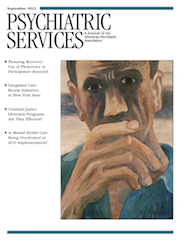Effects of Outpatient Treatment on Risk of Arrest of Adults With Serious Mental Illness and Associated Costs
Abstract
Objective
This study examined whether possession of psychotropic medication and receipt of outpatient services reduce the likelihood of posthospitalization arrest among adults with serious mental illness. A secondary aim was to compare service system costs for individuals who were involved with the justice system and those who were not.
Methods
Claims data for prescriptions and treatments were used to describe patterns and costs of outpatient services between 2005 and 2012 for 4,056 adult Florida Medicaid enrollees with schizophrenia or bipolar disorder after discharge from an index hospitalization. Multivariable time-series analysis tested the effects of medication and outpatient services on arrest (any, felony, or misdemeanor) in subsequent 30-day periods.
Results
A total of 1,263 participants (31%) were arrested at least once during follow-up. Monthly medication possession and receipt of outpatient services reduced the likelihood of any arrests (misdemeanor or felony) and of misdemeanor arrests. Possession of medications for 90 days after hospital discharge also reduced the likelihood of arrest. Prior justice involvement, minority racial-ethnic status, and male sex increased the risk of arrest, whereas older age decreased it. Criminal justice and behavioral health system costs were significantly higher for the justice-involved group than for the group with no justice involvement.
Conclusions
Routine outpatient treatment, including medication and outpatient services, may reduce the likelihood of arrest among adults with serious mental illness. Medication possession over a 90-day period after hospitalization appears to confer additional protection. Overall, costs were lower for those who were not arrested, even when they used more outpatient services.



